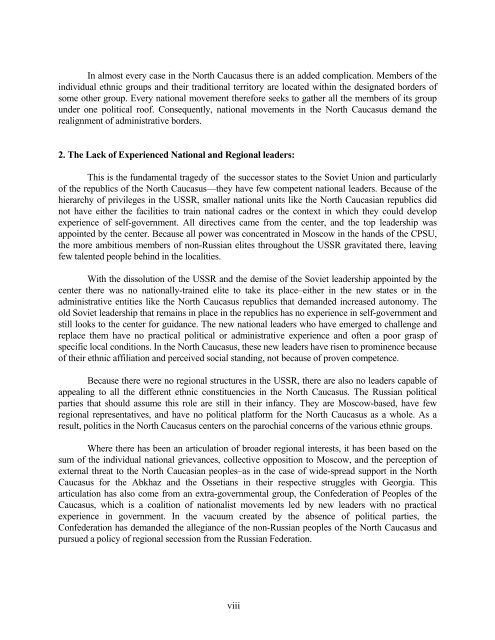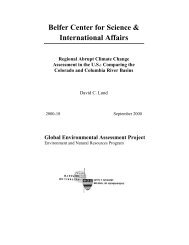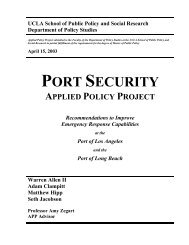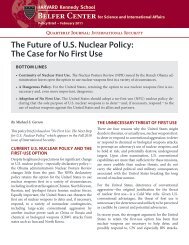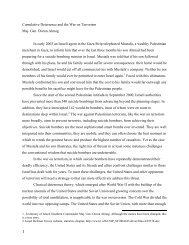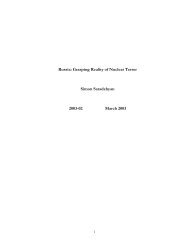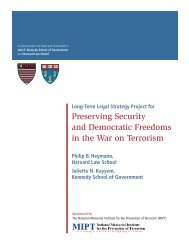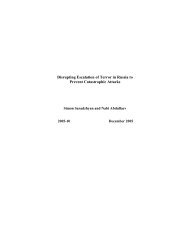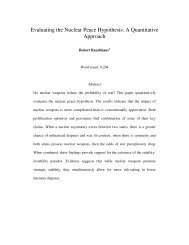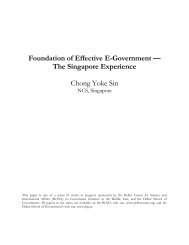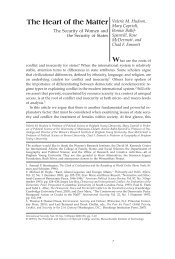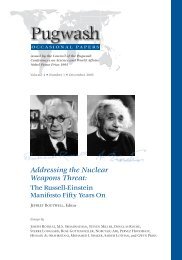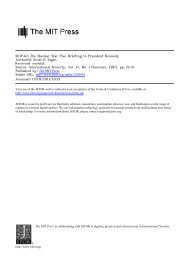RUSSIA'S TINDERBOX - Belfer Center for Science and International ...
RUSSIA'S TINDERBOX - Belfer Center for Science and International ...
RUSSIA'S TINDERBOX - Belfer Center for Science and International ...
You also want an ePaper? Increase the reach of your titles
YUMPU automatically turns print PDFs into web optimized ePapers that Google loves.
In almost every case in the North Caucasus there is an added complication. Members of the<br />
individual ethnic groups <strong>and</strong> their traditional territory are located within the designated borders of<br />
some other group. Every national movement there<strong>for</strong>e seeks to gather all the members of its group<br />
under one political roof. Consequently, national movements in the North Caucasus dem<strong>and</strong> the<br />
realignment of administrative borders.<br />
2. The Lack of Experienced National <strong>and</strong> Regional leaders:<br />
This is the fundamental tragedy of the successor states to the Soviet Union <strong>and</strong> particularly<br />
of the republics of the North Caucasus—they have few competent national leaders. Because of the<br />
hierarchy of privileges in the USSR, smaller national units like the North Caucasian republics did<br />
not have either the facilities to train national cadres or the context in which they could develop<br />
experience of self-government. All directives came from the center, <strong>and</strong> the top leadership was<br />
appointed by the center. Because all power was concentrated in Moscow in the h<strong>and</strong>s of the CPSU,<br />
the more ambitious members of non-Russian elites throughout the USSR gravitated there, leaving<br />
few talented people behind in the localities.<br />
With the dissolution of the USSR <strong>and</strong> the demise of the Soviet leadership appointed by the<br />
center there was no nationally-trained elite to take its place–either in the new states or in the<br />
administrative entities like the North Caucasus republics that dem<strong>and</strong>ed increased autonomy. The<br />
old Soviet leadership that remains in place in the republics has no experience in self-government <strong>and</strong><br />
still looks to the center <strong>for</strong> guidance. The new national leaders who have emerged to challenge <strong>and</strong><br />
replace them have no practical political or administrative experience <strong>and</strong> often a poor grasp of<br />
specific local conditions. In the North Caucasus, these new leaders have risen to prominence because<br />
of their ethnic affiliation <strong>and</strong> perceived social st<strong>and</strong>ing, not because of proven competence.<br />
Because there were no regional structures in the USSR, there are also no leaders capable of<br />
appealing to all the different ethnic constituencies in the North Caucasus. The Russian political<br />
parties that should assume this role are still in their infancy. They are Moscow-based, have few<br />
regional representatives, <strong>and</strong> have no political plat<strong>for</strong>m <strong>for</strong> the North Caucasus as a whole. As a<br />
result, politics in the North Caucasus centers on the parochial concerns of the various ethnic groups.<br />
Where there has been an articulation of broader regional interests, it has been based on the<br />
sum of the individual national grievances, collective opposition to Moscow, <strong>and</strong> the perception of<br />
external threat to the North Caucasian peoples–as in the case of wide-spread support in the North<br />
Caucasus <strong>for</strong> the Abkhaz <strong>and</strong> the Ossetians in their respective struggles with Georgia. This<br />
articulation has also come from an extra-governmental group, the Confederation of Peoples of the<br />
Caucasus, which is a coalition of nationalist movements led by new leaders with no practical<br />
experience in government. In the vacuum created by the absence of political parties, the<br />
Confederation has dem<strong>and</strong>ed the allegiance of the non-Russian peoples of the North Caucasus <strong>and</strong><br />
pursued a policy of regional secession from the Russian Federation.<br />
viii


